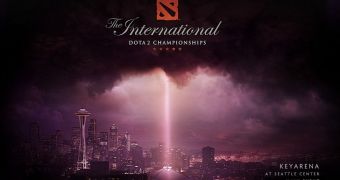Valve boss Gabe Newell has talked a bit about the Multiplayer Online Battle Arena (MOBA) genre and its huge popularity, confirming how games like its own Dota 2 can reward players for improving their skills throughout a long period of time.
Dota 2 and fellow MOBA titles like League of Legends command cult-like followings around the world, with tens of millions of players flocking to the online experiences every month, taking them to new heights in terms of popularity and profitability, despite being free-to-play games.
As you can imagine, Valve's Dota 2 is doing quite well, especially since the ongoing The International 4 tournament has raised a huge amount of money from the community for its prize pool.
Studio boss Gabe Newell has talked with eSports team Natus Vincere on YouTube and shared his thoughts about the popularity of the MOBA genre overall and how it manages to trump the experiences seen in regular games.
"I think there are big trends going on both among game players and game developers trying out new overall themes and styles. I think in particular MOBA rewards you the longer you play, there's not really an end point," he says.
"In other games, you get to a certain point and even though you play it very well, it doesn't reward you for playing better. MOBAs reward you for playing better."
What's more, tournaments like The International serve to reward professional players for the amount of work they do and for their ability to make the game even more popular through their performances, according to Newell, who shares just how the idea came to be among the Dota 2 team.
"The International grew out of a conversation between people on the Dota 2 team. [Original Dota creator] Icefrog thought it would be a good idea to try it out. We tried to think of how you reward people for the different things they bring."
"Some people are fun to play with, some people make items for the workdshop. And it seemed that the professional players were generating a lot of value to the community so The International 1 grew out of that idea, of how can we return to them some of the things they've already given to the community."
Since The International 1, the tournament has grown in size and prize pool, culminating with this week's The International 4, which has just seen its group stages conclude. Later this week, the main even begins in Seattle's Key Arena and is set to conclude on Monday with the grand final.

 14 DAY TRIAL //
14 DAY TRIAL //